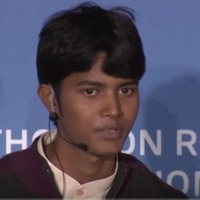
I am very lucky and I am very happy that today I am speaking in front of you because when I was just 6 years old I was used to work in Mica mine. Mica mine is very hazardous. More than 400 feet down you will have to go to collect the mica and you don’t know that you are. Make sure about your life because any time the mine will collapse on you, probability is high for that. So, in front of my eyes, one of my best friends I have seen to die. I can’t explain it in my own words that, how much painful that was for me. And this is very painful, painful for me to recall that. At that time where I was just 7 years old and mica is very hazardous. You will have many diseases related to your stomach, related to your lungs, and if you make any mistakes then you will cut your hands by the sharp mica.
So still they are working, many children, and I was lucky that I was rescued from there by the BB activist Mr. Kailash Satyarthi. And then I took to Bal Ashram. This is a rehabilitation centre and I study there, and I learned there, culture activity, I learned there drama and I started my study from there. And I passed their senior high school and I got admission in to university.
So, I want to say that the responsible person, they are spending their time to collecting their data and only they are working on paper. So, we have to do some practical work. Because time will not afford that child who is slave. One time and one second is important for that slave and for that child who is still working and who is bonded child labourer. So, we have to do some practically. Many international companies are making their money by using cheap labour, as me. They are earning many money, but they have to see that I am earning money this is, by using the child slavery so this is a very bad thing. So, we have to do practically to change society and we have to do something fast because the time is passing very quickly and that one minute, that one second is very important for that child who is working now. And one of my friends, this is very difficult and painful for me to recall that in front of my eyes my friend, got death there. When he was working inside the mine, suddenly the biggest stone and all the sand and mud collect on him and I was not able to see my friend, where is he? Because he was inside the mine and the big stone and the sand was over that. So, I don’t want this type of accident to be with another.
Every man said that we are responsible, so we are sitting here so we have to take responsible that no child will be in slavery and no child will be child labour. And we have to eradicate the child slavery, child labour, and bonded child labour from all the world.
Thanks.
This narrative was recorded at Trust Conference, the Thomson Reuters Foundation’s flagship event. Trust Conference is committed to finding real solutions to fight slavery, empower women, and advance human rights worldwide. The annual event convenes global corporations, lawyers, government representatives, and pioneers at the forefront of the fight for human rights.









